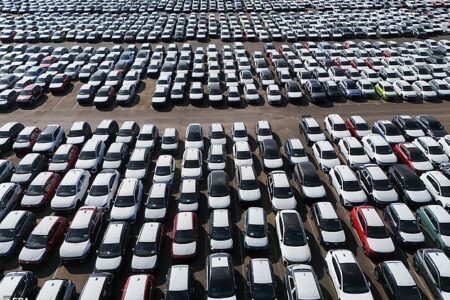The chief victims of Donald Trump‘s new tariffs will be Americans. The President’s 25 per cent levy on all imported cars, to sit alongside those on steel and aluminium, will inevitably result in price rises.
Most obviously, imported cars will become more expensive. But so will American vehicles as their manufacturers will no longer need to worry about competition.
The sheer self-harming folly of this policy should be obvious – and you don’t have to take my word for it. One of Trump’s rather more distinguished predecessors, Ronald Reagan, put it succinctly in his weekly radio address to the nation in 1985.
‘Instead of protectionism, we should call it “destructionism”,’ said the great tax-cutting Republican. ‘Homegrown industries start relying on government protection in the form of high tariffs. They stop competing and stop making the innovative management and technological changes they need to succeed in world markets.’
To make matters worse, as prices rise in showrooms, American consumers will have less to spend on other things, harming the whole economy.
Ironically, given his current role as Trump’s chief cheerleader, Elon Musk explained it beautifully when he was interviewed by the American podcaster Joe Rogan shortly before the President’s inauguration.
It was, recalled the co-founder of Tesla, only competition from Germany and Japan that had rescued US auto companies from their torpor in the 1970s. Faced with superior models from abroad, they were forced to up their game.
The worst possible response to Trump’s act of economic masochism would be to replicate it ourselves. If someone chops off his finger, you don’t retaliate by lopping off one of your own.

President Donald Trump holds up an executive order on auto tariffs after signing it in the Oval Office at the White House

Trump announced new import taxes of 25 percent on cars and car parts coming into the US (stock)
Keir Starmer speaks during a news conference at the UK ambassador’s residence following the Ukraine summit in Paris
Unfortunately, politics and economics are two different beasts. Although free trade is one of the few ideas which every mainstream economist supports, rational arguments count for little when a country feels disrespected.
Canada is in the middle of an election campaign. I have no doubt that the leaders of both the Conservative and Liberal parties there understand that tariffs will impoverish Canadians, but they can’t afford to look weak in the face of Trump’s aggression.
So they will end up imposing a harmful policy – tit-for-tat tariffs on American cars – rather than reason with voters whose blood is up.
Something similar, I suspect, will happen in the EU, which retaliated against Trump’s decision to impose steel and aluminium tariffs in February by introducing its own, to the detriment of its construction workers, car manufacturers, electrical appliance-makers and railways.
So far, to his credit, Keir Starmer has avoided that mistake. Instead of going for cheap applause by imposing tariffs of his own, which would have put up prices for British businesses and British workers, he exercised caution.
Rather than begin a self-mutilating escalation, we need to get the levies lifted. The way to do that is to start the trade talks that Trump proposed when he met Starmer in the Oval Office a month ago.
Although Trump’s tariffs will mainly hurt American consumers, they will also damage British car manufacturers. The US accounts for 18 per cent of our car exports by volume and 27 per cent by value (our transatlantic cousins are drawn to our pricier motors: Jaguars; Aston Martins; Bentleys, and so on).
Plainly, it is in the interest of both countries to lift those restrictions. How to do it? By ensuring that all tariffs are suspended while our trade talks get under way.
Starmer meets with US President Trump in the Oval Office at the White House on February 27, 2025 in Washington
In exchange, Britain should offer, while talks proceed, to suspend the idiotic 10 per cent tariff on US cars that we inherited from the EU – or, at the very least, to cut it to the US rate of 2.5 per cent.
The negotiations themselves should be both urgent and ambitious. British protectionists and Europhile nostalgists have somehow convinced themselves that the talks are all about chlorinated chicken and hormone-treated beef.
In fact, there is no prospect of any significant volumes of US chicken reaching our markets. The economics just don’t work. In any case, Washington is not asking us to alter our food safety rules. What it wants – very reasonably – is to be allowed to sell its goods here when they comply with our laws.
Since we are nowhere near self-sufficiency in beef, there can be no serious argument against allowing US imports, when they come without growth hormones, to compete with those from Ireland and France.
Food, though the most emotive part of any trade talks, is a negligible part of our trade. The real gains for our two countries are in removing tariffs on manufactured goods, in the mutual recognition of professional credentials, and in financial services, tech, AI, pharmaceuticals and defence procurement.
The US is not just our largest market – it is larger than our second, third and fourth-largest markets (Germany, Ireland and the Netherlands) combined.
A lot of the work has already been done. By the end of Trump’s first term, nearly two thirds of the US-UK trade chapters were at or close to completion. We should get on and conclude the deal before Trump’s mid-term elections at the end of next year.
If Starmer can get a deal over the line, he will see both the British economy and his personal ratings soar. And you know what? He will deserve it.


